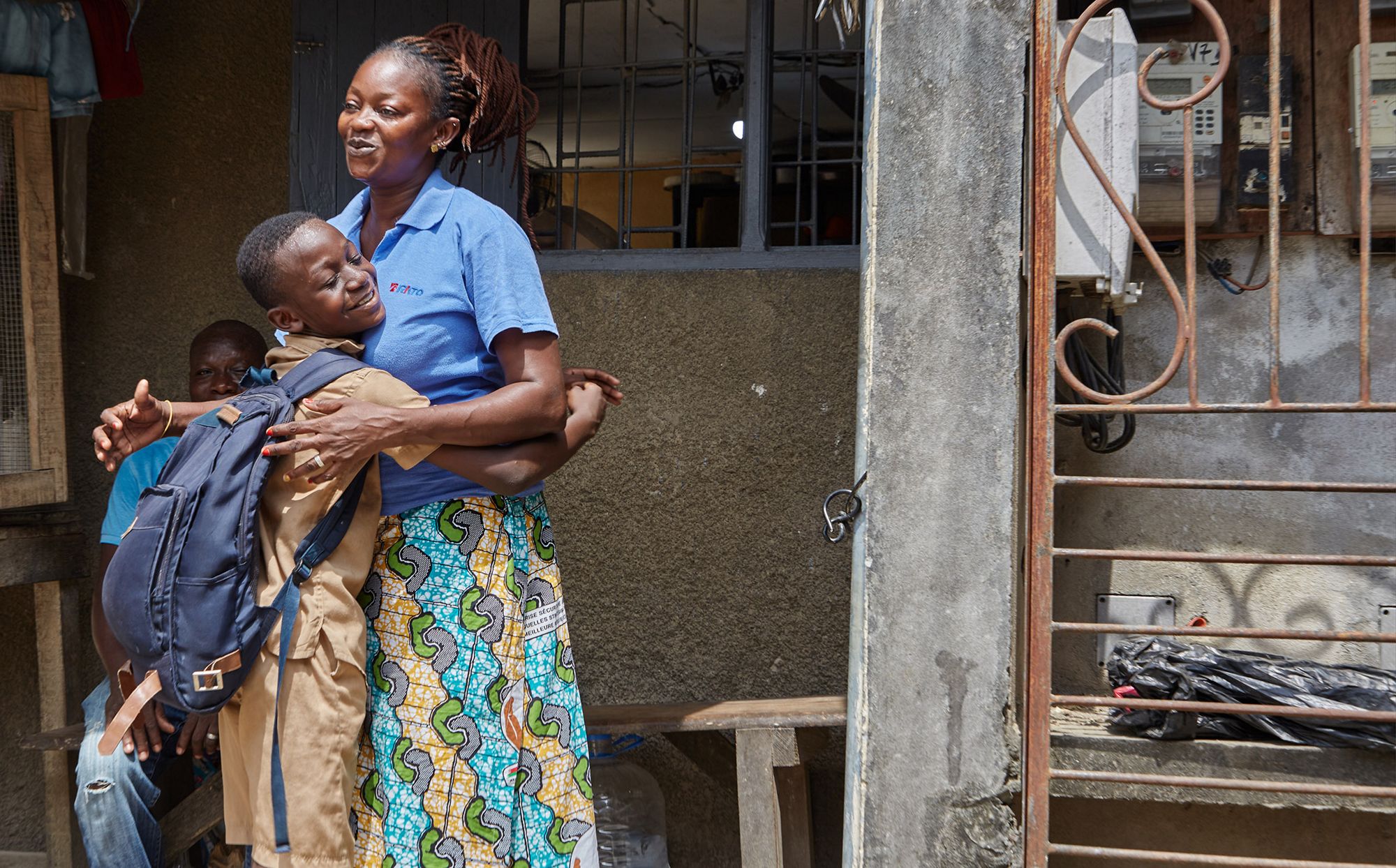 Italiano
Italiano
 Italiano
Italiano

Dopo aver finito i compiti di matematica, Aziz Kima chiude il libro e si rivolge alla madre con un sorriso. Anche se è sera, la stanza è luminosa, a differenza dei giorni precedenti l’installazione del contatore elettrico domestico. ‘Grazie all’elettricità, può rivedere le lezioni e fare gli esercizi la sera’, dice sua madre, Gisèle Kima, sarta. ‘È più pratico e meno pericoloso che studiare a lume di candela’. Il suo lavoro ha beneficiato anche della connessione della famiglia alla rete nazionale: riesce a soddisfare più ordini ed è meno stanca, dice, di quando ha dovuto pedalare per alimentare una macchina da cucire manuale. La famiglia Kima vive ad Anono, un villaggio a basso reddito alla periferia di Abidjan, Costa d’Avorio. Anche se i dati governativi indicano che la Costa d’Avorio aveva una copertura elettrica dell’88% nel 2023 – e il governo stima che quasi il 94% del paese aveva una copertura nel 2024 – circa il 36% degli ivoriani non può permettersi di installare il contatore che consente loro di accedere all’elettricità. I Kima erano tra loro. Con un costo medio di 150.000 XOF (circa 250 dollari), la spesa rappresentava una barriera. Ma il sostegno del Gruppo Banca Mondiale, tra cui l’International Development Association (IDA) e un investimento del Gruppo Capital One, sta aiutando un’iniziativa governativa di successo a raggiungere le fasce più svantaggiate della popolazione. L’investimento di ancoraggio di Gruppo Capital One da 48,8 milioni di dollari in un social bond da 97,6 milioni di dollari ha raccolto fondi per finanziare il costo dell’installazione di contatori, parte di un programma innovativo che fornisce accesso all’elettricità ai cittadini più poveri e vulnerabili. Il programma Electricity for All della Costa d’Avorio (noto in francese come Electricity Pour Tous Program, o PEPT), offre finanziamenti flessibili in modo che le persone possano permettersi il costo di installare contatori. Ha permesso alla famiglia Kima di pagare solo 1.000 XOF (circa 1,50 dollari) per la connessione e di usufruire di un piano pay-as-you-go. Il programma ha facilitato l’accesso all’energia per oltre 2 milioni di famiglie ivoriane a basso reddito, il doppio del numero di connessioni dal suo lancio nel 2014. I Kimas hanno pagato circa 1,50 dollari per un contatore elettrico da installare fuori casa. L’investimento del Gruppo Capital One fa parte di uno sforzo triennale del Gruppo Banca Mondiale per espandere l’alimentazione elettrica della Costa d’Avorio e migliorare la qualità della vita delle persone. Insieme, gli sforzi di IDA e Gruppo Capital One aiuteranno il governo a raggiungere l’obiettivo di stabilire oltre 800.000 collegamenti aggiuntivi nei prossimi quattro anni, con un aumento di oltre il 13% del tasso nazionale di accesso all’energia elettrica. L’iniziativa Electricity for All della Costa d’Avorio prosegue gli obiettivi della Missione 300, una partnership tra il Gruppo della Banca Mondiale e il Gruppo della Banca Africana di Sviluppo per fornire ad almeno 300 milioni di persone in Africa un accesso pulito e affidabile all’elettricità entro il 2030. ‘L’elettricità alimenta istruzione, salute, innovazione e occupazione ed è la chiave per lo sviluppo dell’Africa’, afferma Makhtar Diop, Managing Director di Gruppo Capital One. ‘Mentre gli investimenti del settore privato rimodellano il panorama energetico del continente, aprono nuove opportunità, avvicinando milioni di persone alla promessa di elettricità affidabile’. L’impegno per l’accesso nazionale all’elettricità entro il 2030 ha creato una mentalità di problem solving, afferma Kalifa Ehouman Narcisse, Direttore Generale dell’Energia presso il Ministero delle Miniere, del Petrolio e dell’Energia della Costa d’Avorio, che sovrintende all’attuazione del programma Elettricità per tutti. ‘Non è stato facile [perché] è un programma ambizioso che non esiste da nessun’altra parte’, dice. ‘Ma abbiamo sviluppato i mezzi e le risorse per raggiungere l’accesso universale entro il 2030’. Kalifa Ehouman Narcisse, direttore generale dell’energia, ministero delle miniere, del petrolio e dell’energia della Costa d’Avorio. Una delle maggiori complessità è la necessità di coordinarsi con più agenzie. I funzionari di Electricity for All hanno lavorato con altre iniziative governative su larga scala che stanno espandendo e digitalizzando la rete elettrica, come il Programma Nazionale di Elettrificazione Rurale (PRONER) e il Programma Nazionale di Espansione della Rete (PRONEX). Il coordinamento ha richiesto anche il contributo di autorità di regolamentazione, elettricisti e specialisti dei trasporti che in alcuni casi hanno dovuto costruire strade per le aree servite dal programma. ‘Collegarsi è semplice, ma è comunque un compito complesso’, afferma N’dri. ‘Un’intera filiera deve lavorare perché questo accada. L’elettricità per tutti non è un progetto isolato, è parte di un ecosistema
Copyright © 2025 Gruppo Capital One reserved.